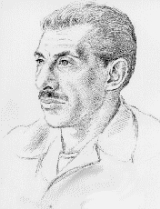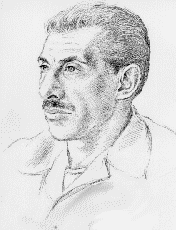
The Commanding Self
Encyclopedia
The Commanding Self is a book by the writer Idries Shah
published by the Octagon Press
in 1994. A paperback edition was published in 1997.
Shortly before he died, Shah stated that his books form a complete course that could fulfil the function he had fulfilled while alive. As such, The Commanding Self can be read as part of a whole course of study.
Shah stated that The Commanding Self was 'the key to understanding his entire corpus of work.'
 The Commanding Self builds on the foundations laid in Shah's previous publications Learning How to Learn – Psychology and Spirituality in the Sufi Way and Knowing How to Know
The Commanding Self builds on the foundations laid in Shah's previous publications Learning How to Learn – Psychology and Spirituality in the Sufi Way and Knowing How to Know
.
The Commanding Self (Arabic Nafs-ul-Amara اﻟﻧﻔﺲﻻﻣﺎﺮﺓ) is Sufic terminology for the 'mixture of primitive and conditioned responses, common to everyone, which inhibits and distorts human progress and understanding'.
The opening pages of the book expand on this definition:
'The Commanding Self . . . can be seen as a sort of parasite, which first complements the personality, then takes over certain parts of it, and masquerades as the personality itself.' Shah states that there is 'no intention of destroying or undermining the Commanding Self.' Instead, would-be students are encouraged to 'divert vanity from the spiritual arena . . . to channel the Commanding Self's activities to any worldly ambition: while continuing to study the Sufi Way in a modest and non-self-promoting manner.'
Written in response to requests for 'clarification, interviews, question-and-answer sessions, lectures', the following sections of the book present study themes intended to enable the student to observe the functioning of their own emotional and conditioned responses.
prize winner Doris Lessing
wrote of The Commanding Self; 'What Sufis offer is learning, through experience. But if Sufism
is not to be understood by people not involved in the process of becoming Sufis, or working with Sufis, what hope is there for outside enquirers; what use is a book like this one? But this is exactly where The Commanding Self comes in, and other books Idries Shah has been publishing which are part of a "course," if you like, and designed to introduce the interested to this way of looking at life, as well as teaching students. An analogy they use is that a dried peach is not a peach, but may prepare you to recognize fresh peaches when at last you eat one.'
Idries Shah
Idries Shah , also known as Idris Shah, né Sayed Idries el-Hashimi , was an author and teacher in the Sufi tradition who wrote over three dozen critically acclaimed books on topics ranging from psychology and spirituality to travelogues and culture studies.Born in India, the descendant of a...
published by the Octagon Press
Octagon Press
Octagon Press is a cross-cultural publishing house based in London, UK. It was founded in 1960 by Sufi teacher, Idries Shah to establish the historical and cultural context for his ideas.-Description:Octagon Press published many of Shah's later works...
in 1994. A paperback edition was published in 1997.
Shortly before he died, Shah stated that his books form a complete course that could fulfil the function he had fulfilled while alive. As such, The Commanding Self can be read as part of a whole course of study.
Shah stated that The Commanding Self was 'the key to understanding his entire corpus of work.'
Content

Knowing How to Know
Knowing How to Know is a book by the writer Idries Shah published posthumously by Octagon Press in 1998. A paperback edition was published in 2000....
.
The Commanding Self (Arabic Nafs-ul-Amara اﻟﻧﻔﺲﻻﻣﺎﺮﺓ) is Sufic terminology for the 'mixture of primitive and conditioned responses, common to everyone, which inhibits and distorts human progress and understanding'.
The opening pages of the book expand on this definition:
'The Commanding Self . . . can be seen as a sort of parasite, which first complements the personality, then takes over certain parts of it, and masquerades as the personality itself.' Shah states that there is 'no intention of destroying or undermining the Commanding Self.' Instead, would-be students are encouraged to 'divert vanity from the spiritual arena . . . to channel the Commanding Self's activities to any worldly ambition: while continuing to study the Sufi Way in a modest and non-self-promoting manner.'
Written in response to requests for 'clarification, interviews, question-and-answer sessions, lectures', the following sections of the book present study themes intended to enable the student to observe the functioning of their own emotional and conditioned responses.
Reception
Upon its publication, NobelNobel Prize
The Nobel Prizes are annual international awards bestowed by Scandinavian committees in recognition of cultural and scientific advances. The will of the Swedish chemist Alfred Nobel, the inventor of dynamite, established the prizes in 1895...
prize winner Doris Lessing
Doris Lessing
Doris May Lessing CH is a British writer. Her novels include The Grass is Singing, The Golden Notebook, and five novels collectively known as Canopus in Argos....
wrote of The Commanding Self; 'What Sufis offer is learning, through experience. But if Sufism
Sufism
Sufism or ' is defined by its adherents as the inner, mystical dimension of Islam. A practitioner of this tradition is generally known as a '...
is not to be understood by people not involved in the process of becoming Sufis, or working with Sufis, what hope is there for outside enquirers; what use is a book like this one? But this is exactly where The Commanding Self comes in, and other books Idries Shah has been publishing which are part of a "course," if you like, and designed to introduce the interested to this way of looking at life, as well as teaching students. An analogy they use is that a dried peach is not a peach, but may prepare you to recognize fresh peaches when at last you eat one.'

